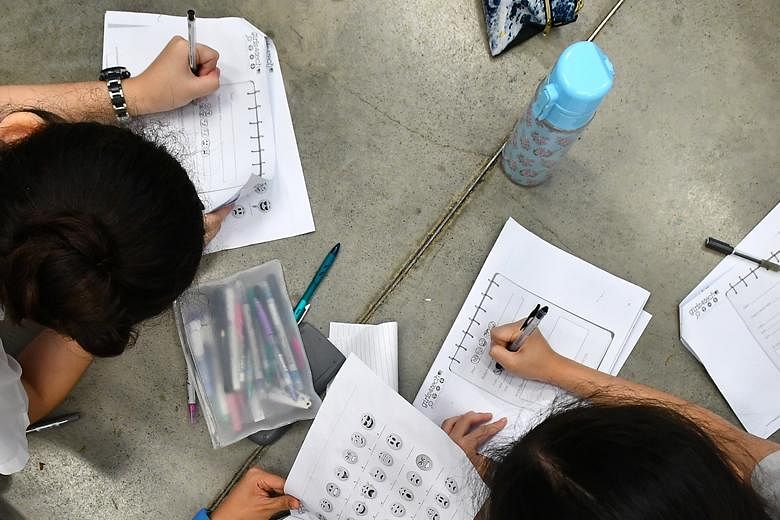SINGAPORE - Singapore students are some of the most resilient in the world, and are more likely to rise over disadvantaged backgrounds and do well in school.
Still, data from the Organisation for Economic Cooperation and Development (OECD) shows that students coming from poorer families are more than four times more likely to be low performers, compared with more affluent peers.
These students are more likely to score below the baseline proficiency in science, according to the latest results of the Programme for International Student Assessment (Pisa) 2015 test.
The survey, which defined disadvantaged students as being in the bottom quarter of the socio-economic index within their country, polled 540,000 teens from 72 economies. These include about 5,800 students from Singapore.
But it also showed that a significant proportion of Singapore students also beat the odds to do well. The Republic, along with Japan, has the fourth most number - or nearly 50 per cent - of such students.
OECD considers them resilient students, as they emerge in the top quarter of performers and outperform what is predicted by their backgrounds. Vietnam has the most, with 75.5 per cent, followed by Macau and Hong Kong, with more than 60 per cent each.
Education observers said schools' support programmes and financial assistance schemes have helped needy students to level up.
But they noted that social inequality in schools is a trend that bears watching, even as parents play an increasing role in their children's education.
The OECD report, titled Excellence And Equity In Education, stated that while the impact of socio-economic disadvantage varies across economies, its association with low performance is statistically significant in all Pisa-participating economies.
"This shows the pervasiveness of the impact of socio-economic 'circumstances' on student achievement, no matter the level at which school systems perform as a whole," it said.
To compile an index of social, economic and cultural status, the study gathered data about individuals' backgrounds, such as their parents' jobs and qualifications, home resources and environment.
In Singapore, socio-economic differences accounted for 17 per cent of the variation in students' science performance in Pisa, compared with the OECD average of 13 per cent.
At the school level, nearly two-thirds - or 60.9 per cent - of the variation in schools' science scores here is accounted for by the socio-economic make-up of their students. The OECD average is 62.9 per cent.
Professor Kerry Kennedy from the Education University of Hong Kong told The Straits Times that this means the school a student attends is likely to "be a good indicator of whether he or she will score well in Pisa".
"A large part of a school's influence can be attributed to the kind of students who attend it and the families from which they come," said the academic, who was in Singapore in September to give a related lecture.
"More academic students are likely to come from well-off families, so schools benefit from the cultural capital that accompanies students from these families. Equally, students who come from disadvantaged families do not have this kind of cultural capital and this affects their academic performance," said Prof Kennedy.
Experts said that the Pisa findings are supported by a global body of research literature that points to social inequalities in student achievement.
National Institute of Education don Jason Tan said: "Even former prime minister Lee Kuan Yew admitted that there's this connection between socio-economic status and student attainment."
But socio-economic statusis "about likelihood rather than something cast in stone that automatically pre-determines academic performance", and the education system here is still a channel for social mobility across generations, he said.
The job for schools, he added, is to help less well-off students level up to their peers. "Schools can do their part to make sure these students do not lose out unduly on academic and non-academic opportunities - such as internships and honing leadership skills - because of their background.
"Schools can't change what happens at home, what they can do is to focus on what they can offer students. They can't totally obliterate the effects of socio-economic status, but they can try and minimise them," said Associate Professor Tan.
National University of Singapore economics lecturer Kelvin Seah said more financial resources such as bursaries and instructional support such as smaller class sizes could be made available for these students.
In response to queries from The Straits Times, the Ministry of Education (MOE) said that it is "committed to providing quality and affordable education for all Singaporeans".
"No Singaporean will be denied an education because of his or her financial background. Education is highly subsidised for Singaporeans at all levels - at over 90 per cent of total education costs for primary, secondary and pre-university levels."
The ministry's spokesman said that there is a range of financial assistance programmes and that schools can use extra funds for students who need more support.
There is further support for all students beyond financial aid, added the MOE spokesman. This includes learning support programmes for those who need more academic help, school-based student care centres that provide a more structured after-school learning environment and subsidised enrichment programmes and overseas trips.
"MOE will continue to ensure all students have access to quality education and opportunities to develop their interests and strengths in their schooling years, regardless of their starting points," she said.


